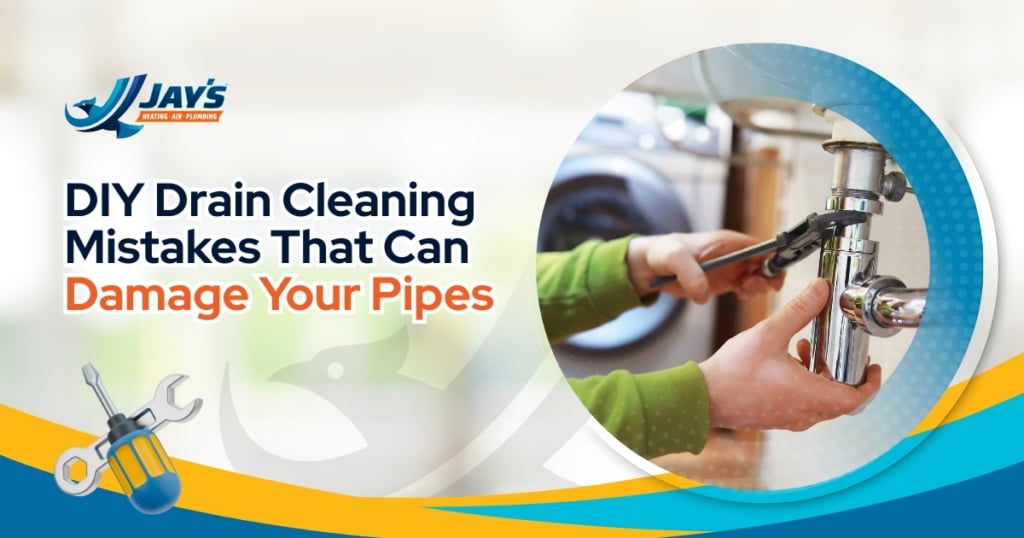
The Bottom Line
- Chemical drain openers, boiling water, and forcing tools into drains often create bigger repairs than the original clog.
- Methods to unclog drains safely include correct plunging, P-trap cleaning, and regular maintenance.
- Homemade drain cleaner risks include pipe damage, gasket failure, and poor results that leave hidden buildup.
- Jay’s offers expert inspections and drain cleaning services for homeowners in Mount Airy.
The Risk of DIY Drain Cleaning: What Homeowners Should Know
While DIY drain cleaning may seem convenient and straightforward, attempting to unclog drains without proper knowledge or tools can result in mistakes that turn minor clogs into plumbing emergencies. Learning how to unclog a drain safely can help prevent damage to your pipes and health.
Understanding common drain cleaning risks helps homeowners decide when to attempt small fixes themselves and when to seek professional support. DIY drain cleaning risks include:
- Pipe damage: DIY methods can crack, corrode, or weaken plumbing materials. Even small cracks may cause leaks inside walls or under floors.
- Safety hazards: Some cleaning methods can pose health risks to the skin, eyes, and respiratory system in confined spaces.
- Not eco-friendly: Harsh chemicals flushed into the drain can contaminate groundwater and harm local ecosystems.
- Temporary fix: Many DIY solutions break up only part of the clog, leaving grease, soap, and hair deeper in the line. Without a proper fix, clogs can persist and worsen.
Common DIY Drain Cleaning Mistakes That Can Damage Pipes
Before attempting to clean your drains, consider these common drain clearing errors.
Using chemical drain cleaners too often
Commercial liquid cleaners promise fast results, but their impact is often temporary and potentially hazardous. These cleaners use acidic or caustic ingredients to break down organic materials, such as grease, food, or hair.
However, since they don’t discriminate between different materials, these cleaners can also accelerate wear on plumbing equipment, weakening PVC pipe walls or corroding metal pipes. With repeated use, chemical drain cleaners damage and shorten the lifespan of your plumbing system. Chemical cleaners also create health risks in enclosed spaces, whether from fumes or contact. If the cleaner doesn’t clear the clog, it often remains trapped in the line and may splash onto the next person attempting a repair.
Pouring boiling water down drains
While hot water can break down grease or soap residue to fix minor blockages, avoid pouring boiling water down your drains. Boiling water may soften PVC pipes or cause metal pipes to warp or crack. It can also degrade joints and traps, especially if hot water increases pressure within the pipes. Boiling water may also melt grease and push it further down the line, where it cools, hardens, and becomes an even more stubborn obstruction.
Improper use of baking soda and vinegar
Baking soda and vinegar are popular DIY drain cleaners, but their fizzing action is rarely potent enough to clear significant clogs. These mixes are best reserved for routine upkeep and removing minor buildup inside pipes. Improper use of baking soda and vinegar may leave residue behind and worsen the blockage, especially if you repeat this method for a single clog.
Forcing tools into drains
Some homeowners improvise by forcing wire hangers, sticks, or other objects down the drain. This strategy often scratches pipe walls, punctures traps, or pushes the clog deeper into the system. Force rarely clears a clog effectively — instead, it usually creates bigger messes.
Misusing plungers or drain snakes
Homeowners often try drain snakes or plungers as DIY fixes, but using these tools without proper technique may worsen the situation. When forced through plumbing bends or joints, snakes may scrape pipe walls, weaken seals, or push clogs further down the line, where they’re harder to reach. Without experience, it’s easy to kink the cable, get the tool stuck, or apply too much pressure inside fragile, aging pipes in older Mount Airy area homes.
Plungers are also helpful for some clogs, but aggressive plunging can loosen pipe joints or damage seals. Many homeowners are also unaware that there are different types of plungers for toilets, sinks, and tubs.
Safer Ways To Unclog a Drain at Home
While some approaches are ineffective or harmful, other options offer gentler remedies for slow drains.
Basic at-home fixes that work
Try these simple fixes if your drains are slow or clogged:
- Remove visible debris by hand: Look for obvious debris collected around or in your drains and remove it by hand, if possible.
- Clear the stopper or strainer: Hair and soap collect under sink stoppers and tub strainers. Remove the stopper assembly, clean the drain opening, and reassemble.
- Use a cup plunger on sinks and tubs: Fill the fixture with enough water to cover the plunger cup, and seal the overflow opening with a damp cloth to prevent air bypass. Plunge steadily five to ten times, then check the flow.
Preventative maintenance tips
Follow these preventative drain cleaning tips to keep your drains clear and lower the risk of emergency fixes:
- Install strainers in sinks and showers to catch hair, food particles, and debris.
- Avoid pouring fats, oils, or grease into kitchen sinks.
- Run hot tap water after using sinks to wash away residue before it has a chance to harden.
- Schedule periodic professional drain cleaning to remove buildup in a controlled, safe manner.
When To Call Jay’s Professional Plumber Instead of DIY
If a clog doesn’t clear after basic troubleshooting, the problem may be deeper in the line and require a licensed plumber to inspect. Call Jay’s for drain cleaning services if you notice these signs:
- Multiple fixtures backing up simultaneously
- Sewer odors in bathrooms, basements, or backyards
- Standing water in bathtubs and other areas
- Tree or bush roots growing near underground lines
Why Homeowners Trust Jay’s in the Mount Airy, NC
Jay’s is a family-owned and operated business with roots in Mount Airy and the surrounding area. Here’s why homeowners continue to rely on our plumbing services:
- Thousands of five-star customer reviews
- 100% guaranteed satisfaction
- Maintenance plans
- Competitive warranties
- Flexible financing options
Book Professional Drain Services With Jay’s in Mount Airy, NC
Avoid common DIY drain cleaning mistakes to protect your plumbing system and save yourself from costly repairs. For minor clogs, simple maintenance steps are often enough, but Jay’s plumbers are ready with expert tools to restore your drains to proper flow. Contact us today to schedule drain cleaning services.
Frequently Asked Questions
What causes most household drain clogs?
Kitchen clogs are often caused by fats, oils, grease, and starches sticking to pipe walls, while bathroom clogs stem from hair and soap products. Small objects, mineral buildup, and low-slope runs add to the buildup.
How do plumbers pinpoint the clog location?
Plumbers test multiple fixtures, check cleanouts, and assess flow to isolate affected sections. If symptoms suggest deeper issues, we use a specialized drain camera to complete a non-invasive inspection.
Can rainstorms trigger sewer backups in homes?
Heavy rain can overwhelm shared systems or saturate soil around older laterals, allowing inflow through joints or cracks or causing unsanitary backups in multiple fixtures. Backwater valves, sound grading, and addressing infiltration points help.

